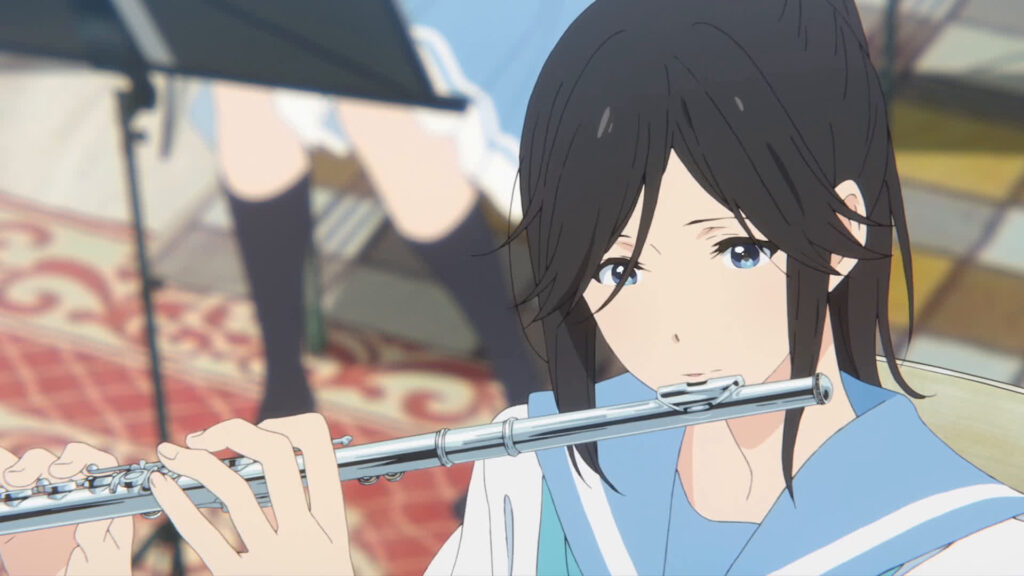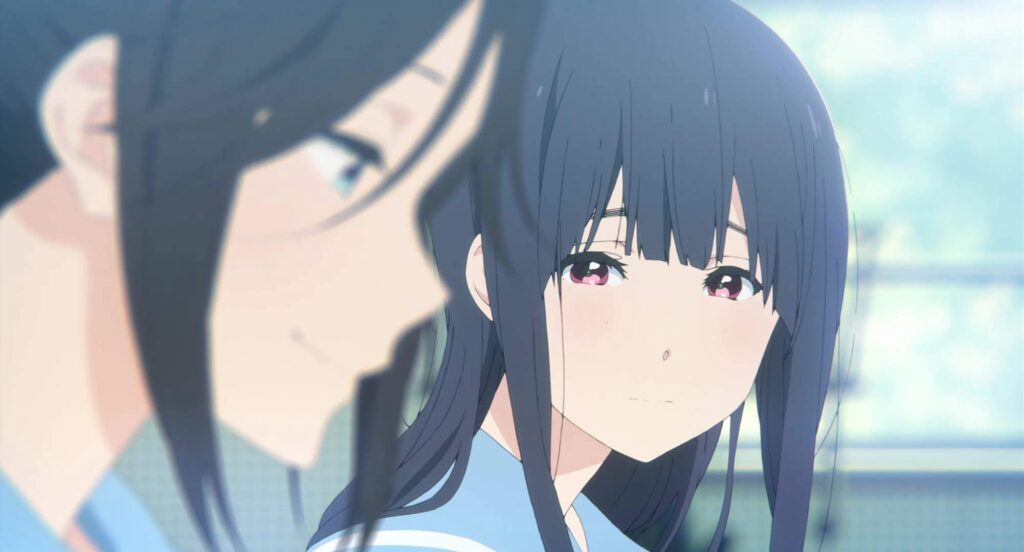
Anime Impact: Liz and the Blue Bird is about letting go of what you love
Since the pandemic I’ve been missing concerts and the feeling of being alive in a crowded and sweaty music venue, waiting for your favourite band to play. I wanted some sort of relief by finding a new music anime that might replace the void. Who knew trying to find an escape with my usual love for alternative live music, would find its way to an anime called Liz and the Blue Bird – a story about two “totally straight” and “very caring” best friends who play in the classical school band together.
Liz and the Blue Bird was made by Kyoto Animation, those responsible for Free!, Miss Koboyashi’s Dragon Maid, Violet Evergarden, and A Silent Voice: The Movie. Having a Kyoto Animation anime to watch, I knew I was in for a treat, and what made it even better was seeing Nao Touyama (voiced characters in Blue Exorcist and Goblin Slayer) and Atsumi Tanezaki (voiced in Beastars, Fruits Basket, and Durarara!!) on the roster.
The anime tells a story we run into quite frequently in this space, the queerbaiting tale of two “best friends” going through a tough time emotionally, who try to smooth out their feelings by figuring out why they’re upset at each other, and by the end, have a mutual agreement that they are just two gals being pals who had a big misunderstanding.
However, this movie caught my attention after finding an article while digging for more anime, for being an anime adaption for two secondary characters, Mizore and Nozomi from its primary anime: Sound! Euphonium. Starting the movie we meet Mizore, a quiet oboe player who is in love with Nozomi, an eccentric happy-go-lucky flutist. Together they prepare for their school’s concert.
The school’s concert is based on the story of Liz and the Bird which, even though it is depicted in a book in the anime from the student’s perspective, through the audience’s screen we see Liz and her journey with the bluebird, come to life. Liz is a baker who lives in the countryside by herself, living every day by waking up, going to work, coming back home, having dinner, and repeating. Until one morning after a storm, she finds a girl in blue passed out in her front lawn, who she later finds out was a bluebird that she met days prior. The bluebird wanted to become human so she could keep Liz company.
We see Liz’s story unfold as we get to know more about Mizore and Nozomi. Liz and The Blue Bird makes it known that Mizore has a crush by paying attention to Nozomi’s little mannerisms; her swaying ponytail, her head tilts which leaves the side of her neck exposed, Nozomi’s smile when she recalls memories, and her natural positioning in leader roles in and outside of school. Mizore, having got into the band with the help of Nozomi, continues to admire Nozomi’s kindness by becoming a strong musician.

In the movie, it shows both girls are in their senior year without a clue of what to do after they graduate. Mizore is met with the idea of applying to a music college by a teacher who thinks she has the talent, she shares the news to Nozomi and opens the idea that if she also applies, that she herself will follow suit. The situation here opens the conflict of Liz and the Blue Bird, Nozomi upset at Mizore, not understanding why, leaving Mizore confused and upset as well.
While the audience sees a relationship in trouble, the anime pans back to Liz and the bird, with Liz noticing little by little that she keeps the bird from living to her full potential. From catching the bird seeing other flying critters have fun, to asking her why she continues to live with Liz. Liz starts to wonder if keeping someone you love around while they are refrained from experiencing the full and wild experience that is life, is a selfish thing to do. The story parallels back to Mizore and Nozomi, where the anime guides us to think Liz is Mizore, the quiet girl who enjoys the simple life, and the bluebird as Nozomi, the free spirit.
As they try and gear up for their solo for the concert, Nozomi being the main soloist, and Mizore supporting and harmonizing her, they cannot seem to get the pacing or emotion of the composition right, leaving the rest of the class worried that there might be tension between the two best friends. Supporting characters try and help, but as humans do, help cannot be taken if not needed, and sometimes time and space apart does the trick. While Nozomi struggles with a crisis that she might not be good enough for music college, and embarrassed to not be up to par with Mizore’s playing, Mizore practices and blames herself for not harmonizing as well, while reading more into Liz’s story hoping it’ll help clear up what emotion is needed for her part, as well as maybe offering guidance to how to fix the troubled friendship.
Liz and the Blue Bird then blossoms to be a story of letting go of what you love. Mizore goes through an epiphany while reading the storybook, that Liz lets go of the bird, because she loves her, and wants the best for the bluebird, because she knew deep down that she was holding the bird from being happy and making her live a life she wasn’t destined for. So when the next concert practice comes up, Mizore speaks up for the first time, and requests that she wants to start the day with the solo, with her playing as the main soloist, with Nozomi supporting her instead of the usual way around. The audience then realizes in this movie, that Mizore was actually the bluebird in this metaphor, giving a beautiful and moving performance, with Nozomi realizing she has been Liz, holding back Mizore from her full potential.

While this anime did not skip a beat to remind you that these two ladies were, in fact, besties, I saw a story of women who loved and cared for each other, coming to terms that they both are on different paths. After the moving performance the two gave, Mizore, even though claiming she was just saying how much she loves her BFF, she was essentially confessing how much she loves Nozomi, her support, her laugh, the way she gets excited, her everything, and that she will do anything to make her happy. Nozomi, taken back, lets her know that its okay to continue without her in pursuing music college, that she realizes she has been holding back Mizore from reaching her full potential, and that it’ll make her happy if Mizore continues to do what her heart tells her, instead of following Nozomi.
Though this anime is a heartwarming tale of two girls learning that wanting different things and loving each other is absolutely fine, it offers more than just that. Wanting to find a music anime that scratched the right part of my brain the way Given did, Liz and the Blue Bird gave me just that, and then some. It will absolutely leave you listening to classical music in your free time, showing how much love the writers to the primary series have for the instruments showcased. The anime also has a cast of supporting characters that you will genuinely be excited to see any time they are on screen. You’ll melt over Ririka’s trendy rose gold hair,her curiosity over Mizore, and her attempts at starting a friendship. Watchers will wish you had friends who picked up on trouble, and would quickly try to seek solutions just as Natsuki and Yuko did for the main protagonists. The design choices over the teachers, from Mr. Nashimoto Hawaiian shirt and hipster glasses combo, to Ms. Niiyama’s whole thing somehow being a literal personification of the word, “comfortable.”
Queerbaiting aside, watching Liz and the Blue Bird as a gay person, you know it’s a wlw story of letting go and continuing supporting the ones you love. Being as visually pleasing as it was, I’m surprised it did not get more recognition out in the West, and hope it can gain more momentum as Sound! Euphonium continues to grow its fanbase.
You can watch Liz and the Blue Bird now by renting or buying it on Amazon and Youtube, or buying it physically on the anime’s direct website. It is worth every penny.
Anime Impact is a column from Monti Velez that looks at anime from a queer perspective.





